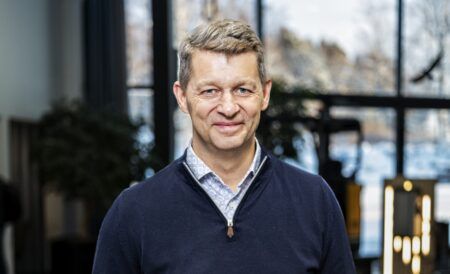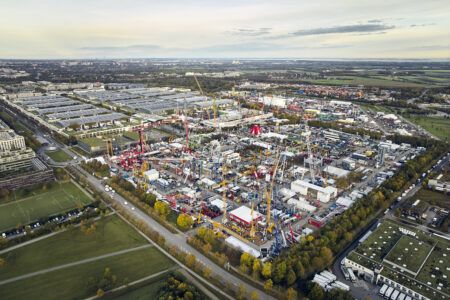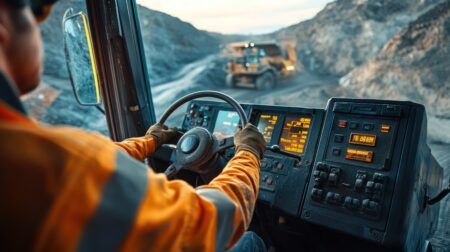Hyster Company set ambitious environmental goals to achieve by 2026. Now at the halfway point, the company reveals the progress so far of its green manufacturing initiatives and innovative products and solutions designed to help customers achieve their sustainability goals
“Part of the overall goal is to significantly reduce our global carbon footprint,” says Conal McNally, environmental engineer for Hyster Europe. “Moreover, environmental targets have been set to reduce carbon emissions, VOC emissions from painting operations, and hazardous waste all by 30%, and water consumption by 20%. We also aim to achieve zero waste landfill at all sites and to offer a greater range of alternative products that enable customers to cut emissions cost-effectively.”
Most manufacturing processes tend to create waste. As a global manufacturer of industrial products, Hyster recognises the importance of responsible material use and is pushing to mitigate its waste footprint across all aspects of the value chain. The majority of waste created in the manufacturing of Hyster® lift trucks is now being recycled.
For instance, in Nijmegen, the Netherlands, where Hyster Big Trucks are produced, any non-recyclable waste is incinerated in the Netherlands’ cleanest burning facility, and any excess heat is used for heating in the factory building and nearby homes. Solar panels have also been fitted to provide some of the power to the site.
“We have already achieved our goal of zero landfill waste at our manufacturing site in Nijmegen,” adds Conal. “And the plant producing Hyster trucks in Craigavon, UK, has also been extended with similar green initiatives at the centre of its design and build.”
The new building design includes a smarter approach to heating, a more effective use of natural light, the creation of areas for biodiversity, and a Sustainable Urban Drainage System (SUDS) amongst other important initiatives. 97% of waste from the site is now recycled, and waste to landfill has reduced by almost 45%. A specialist at the site is working to use materials responsibly in the packaging of Hyster products, and to increasingly make packaging recyclable and sustainable.
To further support the reduction in its carbon footprint, Hyster also employs low emission methods to deliver finished trucks to customers, wherever possible. Hyster ReachStackers, for instance, can be transported by barge from the Nijmegen facility to the main port of Zeebrugge in the Netherlands. Transport on the water reduces the number of trucks on the road, helping save on fuel consumption.
“As well as implementing sustainable manufacturing processes, we are also evolving the complete range of Hyster products towards low or zero emissions with key advances in technology and truck design.,” says Conal. “From Big Trucks used in ports and terminals, right down to low-capacity lift trucks in busy logistics operations, Hyster products increasingly incorporate a range of clean energy solutions.”
For example, innovative applications of lithium-ion batteries and hydrogen fuel cells are enabling Hyster to develop zero emission Container Handlers and ReachStackers for the first time.
Plus, Stage V engines that comply with EU emission regulations are introduced for Hyster Big Trucks, with capacities of 8-tonnes or more, helping businesses comply with emissions legislation, while also heightening productivity, and reducing the cost of ownership for the customer.
In 2021 the Hyster® J10-18XD lift trucks were also launched, featuring lithium-ion battery packs and up to 18 tonnes lift capacity, for comparable performance to ICE trucks, but with zero emissions. This follows the recent launch of the 7-9 tonne lift capacity, J7.0-9.0XNL series of electric lift trucks, with fully integrated lithium-ion batteries and rapid opportunity charging.
“A big part of our green approach is supporting customers across multiple industry sectors in their own sustainability objectives with the right products, and the right aftermarket solutions, such as carbon-neutral lubricants,” says Conal.
Some Hyster Big Trucks for the European market are prefilled with Shell’s carbon neutral engine oil, and it is also in use at the factory producing Hyster lift trucks in Craigavon, Northern Ireland.
“The demand for sustainability is growing across all areas of the materials handling industry, to comply with legislation, company environmental targets, and CSR policies,” says Conal. “Like many of our customers, we are closely monitoring our performance and progress against our own environmental goals and continue to strive for ambitious targets in EMEA. Similar progress is also being made by Hyster in JAPIC and the Americas.”





